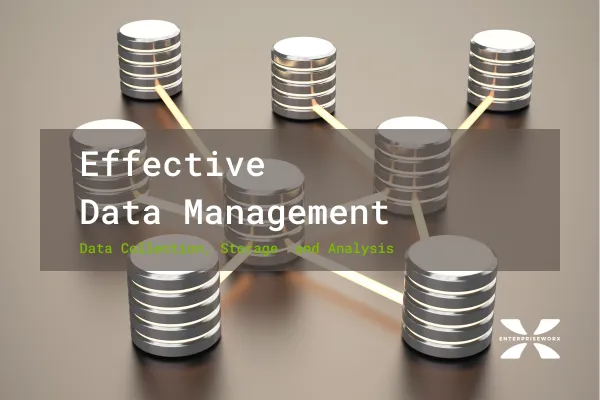ENTERPRISEWORX BLOG

Data Management: Tips and Tools for Effective Data Collection, Storage, and Analysis
Managing data effectively is crucial for businesses and organisations to make informed decisions. Data management refers to the process of collecting, storing, organising, and analysing data in a secure and efficient manner. It is a critical aspect of business operations, as it helps companies make informed decisions and achieve their goals.
Best practices for data management include establishing clear policies and procedures for data collection and storage, ensuring data accuracy and consistency, regularly backing up data to prevent loss or corruption, and implementing security measures to protect sensitive information from unauthorised access or breaches.
It is also important to regularly review and update data management practices to ensure they align with industry standards and regulations. By following these best practices, businesses can effectively manage their data and maximise its value to support their operations and growth.
What is Data Management?
Data management is collecting, storing, organising, maintaining, and analysing data to make informed decisions. Effective data management is essential for businesses and organisations to gain insights into customer behaviour, market trends, and business performance. In this section, we will discuss the different aspects of data management.
Data Collection
Data collection is the first step in the data management process. The type of data collected depends on the business or organisation's goals and objectives. For example, e-commerce companies may collect data on customer behaviour, such as purchases, page views, and time spent on the website.
The data collection process should be well-defined, and data should be collected in a structured format. Data collection can be automated using software tools that collect data from various sources, such as websites, social media platforms, and databases.
Data Storage
Data storage involves storing data in a structured format for easy retrieval and analysis. The type of data storage used depends on the volume and complexity of the data. Small businesses may use spreadsheets or simple databases to store data, while large corporations may use cloud-based storage solutions or data warehouses.
Data storage should be secure and easily accessible to authorised users. Access controls and encryption should be used to protect data from unauthorised access.
Data Organisation
Data organisation involves structuring the data meaningfully, allowing for easy retrieval and analysis. Data should be organised to align with the business or organisation's objectives. For example, data can be arranged by customer, product, or sales region.
Data standardisation is essential for effective data organisation. Standardisation involves ensuring that data is consistent and conforms to a set of rules. This can include standardising data formats, units of measure, and naming conventions.
How can you manage data effectively?
Data is an invaluable asset for businesses of all sizes. Proper data management can help companies make informed decisions, optimise their operations, and improve their bottom line. Here are some of the top tips and tools to help you manage your data better:
Data Maintenance
Data maintenance involves ensuring that data is accurate, up-to-date, and relevant. Regular data cleaning should be performed to remove duplicates, errors, and inconsistencies. Data validation rules should be established to ensure that data meets specific standards.
Data governance policies should be established to ensure that data is used responsibly and ethically. This can include establishing policies for data privacy, security, and sharing.
Data Analysis
Data analysis involves statistical techniques and software tools to analyse data and gain insights into customer behaviour, market trends, and business performance. Data analysis can be performed using various means, including spreadsheets, statistical software, and data visualisation tools.
Data visualisation tools are useful for presenting data visually appealingly, allowing for straightforward interpretation. Visualisation tools like PowerBI can create charts, graphs, and other visualisations that help users gain insights into the data.
Define Your Data Strategy.
Before you start collecting data, defining your data strategy is essential. You should clearly define the types of data you need, the sources of data, and the frequency of data collection. It's also vital to identify the key performance indicators (KPIs) that you will use to measure the success of your data management strategy.
Choose The Right Tools.
Many tools are available for data management, from spreadsheets to databases to cloud-based storage solutions. When choosing a tool, consider the size of your data set, the complexity of your data, and the level of security and accessibility required.
Cloud-based storage solutions like Microsoft Azure are popular for storing data, as they offer easy access, scalability, and security features. Databases like T-SQL are ideal for managing large, complex data sets. Data visualisation tools like Power BI can help you effectively analyse and present your data.
Ensure Data Quality
Data quality is essential for effective data management. Poor-quality data can lead to accurate analysis and better decision-making. To ensure data quality, establish data governance policies, including data validation rules and standardisation guidelines. Regularly check data for errors, duplicates, and inconsistencies.
Use Data Analytics Tools.
Data analytics tools are essential for analysing and interpreting data effectively. Visualisation tools like Power BI can help you present your data in a visually appealing way.
Ensure Data Security
Data security is critical in today's data-driven world. It's crucial to ensure that your data is secure at all stages of the data management process. This includes securing data during data collection, storage, and analysis. Use encryption, access controls, and other security measures to protect your data from unauthorised access.
In conclusion, effective data management is crucial for businesses and organisations to make informed decisions. By defining a data strategy, choosing the right tools, ensuring data quality, using data analytics tools, and ensuring data security, you can manage your data effectively and gain valuable insights to drive your business forward.
At EnterpriseWorx, we understand the importance of data management and governance and its impact on business success. As data-to-decisions partners, we can guide you on the full road from data management to business intelligence. Our team of experts can help you assess your current data management and governance practices, identify gaps and areas for improvement, and develop a roadmap for implementing effective solutions.
Contact us today at www.ewx.co.za or email info@ewx.co.za to learn how we can help you improve your data management and governance practices and gain a competitive advantage in your industry.

ABOUT
+27 11 301 0900
South Africa
01 Sturdee Avenue
Rosebank, JHB, 2196
United Kingdom
1 Moorfield Close,
Moorfield Business Park, Leeds, LS 197YA
Copyright 2003-2023 EnterpriseWorx IT (PTY)LTD